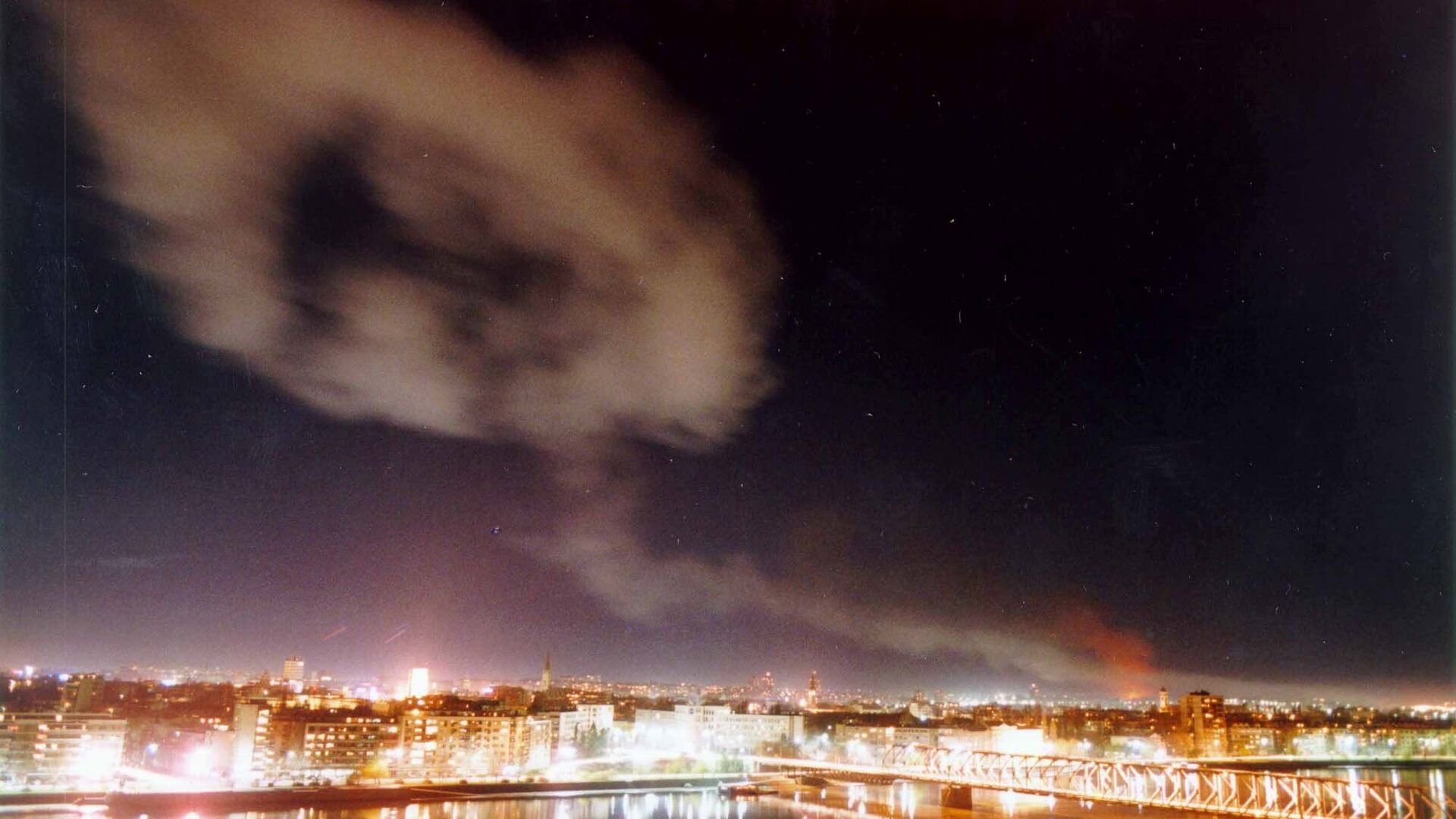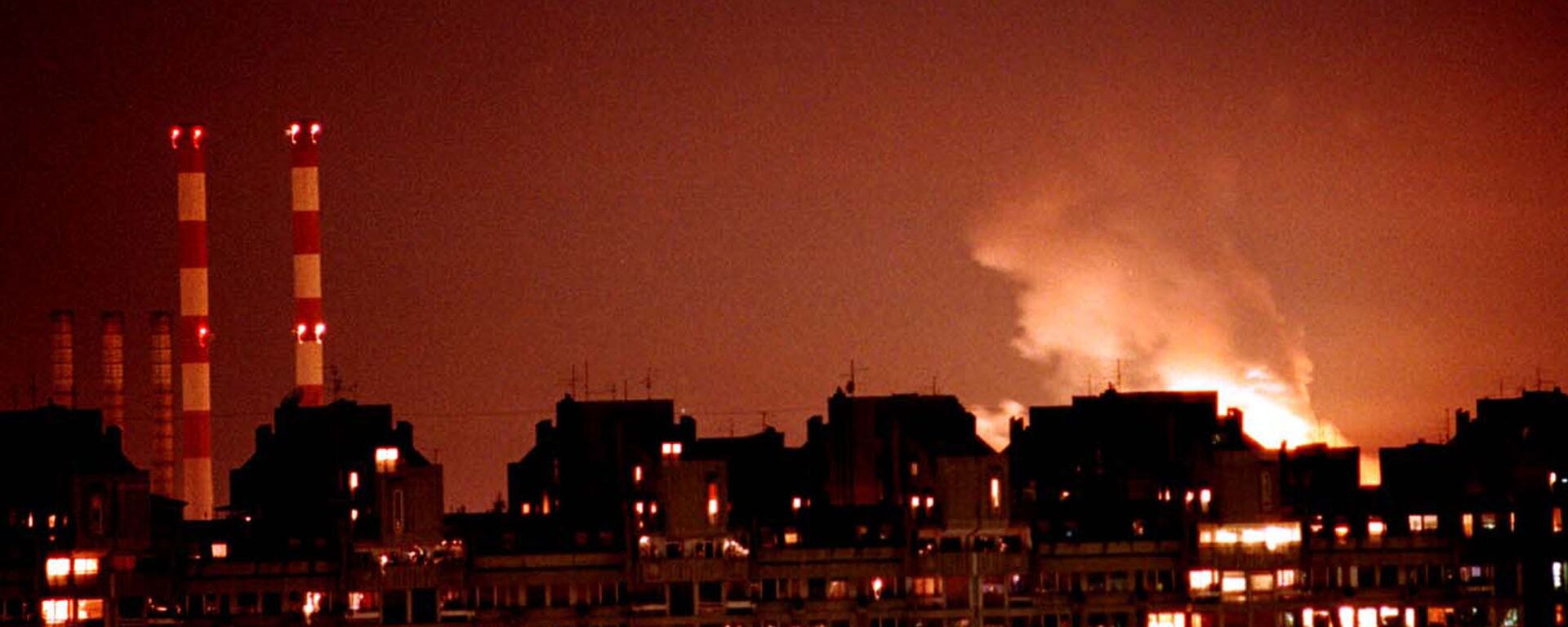https://sputnikglobe.com/20220525/nato-claims-immunity-to-serbian-lawsuit-on-use-of-depleted-uranium-in-1999-bombings-1095778023.html
NATO Claims ‘Immunity’ to Serbian Lawsuits on Use of Depleted Uranium in 1999 Bombings
NATO Claims ‘Immunity’ to Serbian Lawsuits on Use of Depleted Uranium in 1999 Bombings
Sputnik International
The Western alliance spent 78 days bombing Yugoslavia in 1999, contaminating the Balkan nation with at least 15 tonnes of highly toxic depleted uranium (DU)... 25.05.2022, Sputnik International
2022-05-25T19:06+0000
2022-05-25T19:06+0000
2022-05-25T19:31+0000
yugoslavia
nato
bombing
https://cdn1.img.sputnikglobe.com/img/107337/26/1073372650_0:123:2000:1248_1920x0_80_0_0_5c08b5aef0a295c26f30af29bbec3f82.jpg
NATO has formally responded to lawsuits filed by Serbs with the Belgrade High Court over the bloc’s DU munitions use during the 1999 bombing campaign, claiming immunity from prosecution, Srdan Aleksic, a lawyer representing victims, has told Sputnik Serbia.The attorney dismissed the ‘immunity’ claims, insisting that “none of these agreements gives immunity to NATO as an organization, and immunity cannot be applied retroactively. Therefore, NATO cannot receive immunity for war crimes against civilians and for its illegal aggression under the 2005 agreement.""In our case about DU bombings resulting in casualties among the civilian population, soldiers and policemen, NATO carries responsibility for the violation of the right to life and for damages caused,” Aleksic stressed.The attorney expects the Belgrade High Court to proceed with hearings on the matter in October.Aleksic and Italian attorney Angelo Fiore Tartaglia filed a lawsuit against NATO over its use of depleted uranium in the 1999 attack on Yugoslavia in January 2021. Two additional lawsuits were filed earlier this year. Tartaglia had previously successfully represented nearly 200 Italian troops who died of cancer or became seriously ill after being exposed to DU while serving in Kosovo during NATO's 'peacekeeping' mission in that Serbian region.Serbia suffers one of the highest cancer rates in Europe, with nearly 60,000 oncology patients diagnosed each year and the cancer rate among children up to 2.5 times above the European average. Serbian doctors are convinced that the high oncology rate is directly connected to the liberal use of DU munitions during the NATO bombing. Along with cancers, scientists have reported an alarming spike in infertility, autoimmune diseases and mental disorders over the past two decades, including post-traumatic stress and other psychological problems associated with the bombings.Earlier this year, Serbian Institute of Radiology and Oncology director Dr. Danica Grujicic told Sputnik that the 1999 bombings had a devastating impact on the region's ecology and that the use of DU, combined with deliberate attacks on chemical plants and hazardous industrial facilities, created an environmental disaster affecting countries far beyond the borders of the former Yugoslavia.
https://sputnikglobe.com/20220324/serbian-oncology-institute-chief-nato-bombing-caused-environmental-disaster-affecting-all-of-europe-1094160287.html
https://sputnikglobe.com/20220324/we-should-go-in-on-the-ground-watch-biden-complain-nato-bombing-of-yugoslavia-not-ruthless-enough-1094148230.html
yugoslavia
Sputnik International
feedback@sputniknews.com
+74956456601
MIA „Rossiya Segodnya“
2022
News
en_EN
Sputnik International
feedback@sputniknews.com
+74956456601
MIA „Rossiya Segodnya“
Sputnik International
feedback@sputniknews.com
+74956456601
MIA „Rossiya Segodnya“
yugoslavia, nato, bombing
yugoslavia, nato, bombing
NATO Claims ‘Immunity’ to Serbian Lawsuits on Use of Depleted Uranium in 1999 Bombings
19:06 GMT 25.05.2022 (Updated: 19:31 GMT 25.05.2022) The Western alliance spent 78 days bombing Yugoslavia in 1999, contaminating the Balkan nation with at least 15 tonnes of highly toxic depleted uranium (DU) munitions. Serbian attorneys have filed multiple lawsuits against NATO, but have yet to receive any formal admission of wrongdoing by the alliance for its actions.
NATO has formally responded to lawsuits filed by Serbs with the Belgrade High Court over the bloc’s DU munitions use during the 1999 bombing campaign, claiming immunity from prosecution, Srdan Aleksic, a lawyer representing victims, has told
Sputnik Serbia.
“In its statement to the court, NATO’s liaison office in Serbia indicated that the alliance has full immunity under Serbian jurisdiction on the basis of the 2005 agreement between the alliance and the State Union of Serbia and Montenegro ‘On the transit participation and support of peacekeeping operations,’ and the 2006 agreement under which the liaison office in Belgrade was created,” Aleksic said.
The attorney dismissed the ‘immunity’ claims, insisting that “none of these agreements gives immunity to NATO as an organization, and immunity cannot be applied retroactively. Therefore, NATO cannot receive immunity for war crimes against civilians and for its illegal aggression under the 2005 agreement."
"In our case about DU bombings resulting in casualties among the civilian population, soldiers and policemen, NATO carries responsibility for the violation of the right to life and for damages caused,” Aleksic stressed.
The attorney expects the Belgrade High Court to proceed with hearings on the matter in October.
Aleksic and Italian attorney Angelo Fiore Tartaglia filed a lawsuit against NATO over its use of depleted uranium in the 1999 attack on Yugoslavia in January 2021. Two additional lawsuits were filed earlier this year. Tartaglia had previously successfully represented nearly 200 Italian troops who died of cancer or became seriously ill after being exposed to DU while serving in Kosovo during NATO's 'peacekeeping' mission in that Serbian region.
The Belgrade District Court found US General Wesley Clark and NATO Secretary-General Javier Solana guilty of war crimes in September 2000 for the 1999 bombing of Yugoslavia. However, the colour revolution that overthrew Yugoslav President Slobodan Milosevic in October 2000 led to a review of the verdict, and in late 2001, Serbia’s Supreme Court overturned the ruling.
Serbia suffers one of the highest cancer rates in Europe, with nearly 60,000 oncology patients diagnosed each year and the cancer rate among children up to 2.5 times above the European average. Serbian doctors are
convinced that the high oncology rate is directly connected to the liberal use of DU munitions during the NATO bombing. Along with cancers, scientists have reported an alarming spike in infertility, autoimmune diseases and mental disorders over the past two decades,
including post-traumatic stress and other psychological problems associated with the bombings.
Earlier this year, Serbian Institute of Radiology and Oncology director Dr. Danica Grujicic told Sputnik that the 1999 bombings had a devastating impact on the region's ecology and that the use of DU, combined with deliberate attacks on chemical plants and hazardous industrial facilities, created an environmental disaster affecting countries far beyond the borders of the former Yugoslavia.



